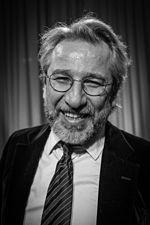Can Dundar
Can Dundar was born in Ankara, Turkey on June 16th, 1961 and is the Journalist. At the age of 62, Can Dundar biography, profession, age, height, weight, eye color, hair color, build, measurements, education, career, dating/affair, family, news updates, and networth are available.
At 62 years old, Can Dundar physical status not available right now. We will update Can Dundar's height, weight, eye color, hair color, build, and measurements.
One of the "best known" figures in Turkish media, Dündar has written for several newspapers, produced many television programs for state-owned TRT and various private channels including CNN Türk and NTV, and published more than 20 books. Dündar is the recipient of the International Press Freedom Award by the Committee to Protect Journalists. In 2016, Can Dündar, together with Erdem Gül, were awarded the Prize for the Freedom and Future of the Media, by the Leipzig Media Foundation, lead partner of the European Centre for Press and Media Freedom. Since June 2016, he has lived in exile in Germany, with an arrest warrant against him in Turkey. Currently he is editor-in-chief of #ÖZGÜRÜZ, a web radio station run by the nonprofit newsroom CORRECTIV. He is also one of the 25 leading figures on the Information and Democracy Commission launched by Reporters Without Borders.
Early life and education
Dündar studied journalism at the Faculty of Political Science, Ankara University, and graduated in 1982. He continued his education at the London School of Journalism in 1986. He received his master's degree in 1988 and in 1996 earned his PhD in political science from the Middle East Technical University, Ankara. Dündar's family is of paternal Circassian and maternal Albanian origin.
Private life
He is married to Dilek Dündar, and the couple have one child. His father allegedly worked for the National Intelligence Organization. He lives in Berlin, Germany. He was attacked many times because of anti-government news by Turks living in Berlin.
Publishing career
Dündar has appeared in various print publications, including Hürriyet (1983–1985), Nokta, Hafta Bakş, Söz, and Tempo. He moderated his own TV-Show 40 Dakika (Turkish) from October 1996 to June 1998, where he explored current Turkish topics. Erbil Tuşalp and Celal Kazdall as the editors-in-chief were shown weekly on Show TV. He worked for Sabah from January 1999 to April 2000 and Milliyet from January 2000. On television, he has appeared in Yanki (1979–83) and 32. Gün (1989–95) was one of many, including Neden. (2009).
"His research often "traces Turkey's rise to a modern world while also giving historical and political insight into important events, debates, and conflicts." This includes profiles of historical and political figures such as Mustafa Kemal Atatürk, Ismet Inönü, Nazim Hikmet, and Vehbi Koç. Rather than a life-size hero, Mustafa's screenplay portrayed the founder of the Republic of Turkey as a regular man with fears, passions, and human hopes.
In August 2013, a long-serving columnist for Milliyet, Dündar, was fired for "writing too loudly" about the Gezi protests and Egypt's changes, according to the paper's owner Erdo Demirören. "We did not want to read stories that would offend the prime minister in this paper," Dündar recalled. Everything displeases them, and if they are dissatisfied, they go after us."
He migrated to Cumhuriyet and became the newspaper's new editor-in-chief on February 8, 2015. Cumhuriyet was given the 2015 Reporters Without Borders Prize for its "independence and brave journalism" in November.
Under the Anti-Terrorist Law of Turkey, Dündar and Cumhuriyet's Ankara bureau chief Erdem Gül was arrested on suspicion of being members of a terrorist group, espionage, and handing over classified information. The probes were launched in May after the newspaper published photographs of weapons transported to Syria in trucks of the National Intelligence Organization, which are subjected to the M-T trucks scandal. Turkish President Erdo slammed Dündar in June 2015, saying: "The individual who revealed this as an exclusive story will pay a hefty sum for it." Dündar was refused colored pencils to draw with in jail, but he created his own paint by pressing fruit in his cell, denying the ban on color and smuggling his artwork out of prison because he "wanted to show that color exists even in the worst of places."
Dündar and Gül were released on February 26, 2016, after the Constitutional Court of Turkey ruled that their detention was a "undue deprivation of liberty."
Multiple journalists caught an assassination attempt on May 6, 2016 in front of the Istanbul courthouse, where Dündar had just been defending himself against allegations of treason. The assassination attempt was blocked by Dündar's wife and a member of parliament, Muharrem Erkek, before he could fire more than two shots. Dündar was unhurt, but another reporter sustained a leg fracture. Undercover police apprehended the assassination attempt. Dündar was sentenced to five years and ten months in jail for allegedly leaking classified information of the state.'
In June 2016, Dündar left for Germany. In August 2016, he resigned from his role as Cumhuriyet's editor-in-chief and announced that he would continue as a columnist in the newspaper. In Turkey, he was issued an arrest warrant in absentia on October 31, 2016.
In absentia, he was sentenced to 27 years and six months in jail for espionage and supporting an active terrorist group.
Awards and honors
- 2016 CPJ International Press Freedom Awards
- 2016 Oxfam Novib/PEN Award
- 2017 Best European Journalist of the Year, Prix Europa

